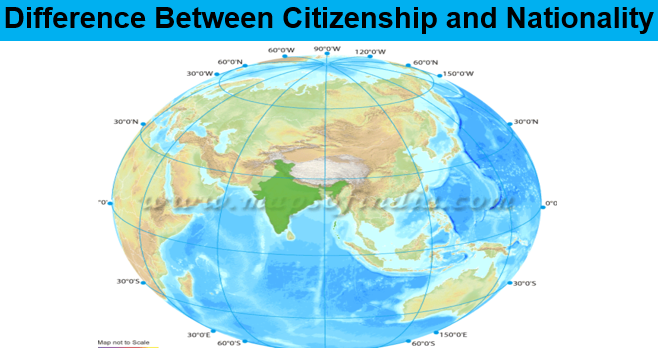What is Difference Between Citizenship and Nationality: The words citizenship and nationality seem to be synonyms to one another, but they are fundamentally quite different concepts in political science. Nationality of persons is the status of belonging to a certain nation or country where they were born. It is basically an ethnic and racial concept. While the citizenship of a person is the position or legal status of being a citizen of a specific sovereign country. Hence citizenship is similar to a judicial idea or term. In this article, we have discussed in detail the “Difference Between Nationality and Citizenship” for the general public as well as for UPSC and other exam aspirants.

Table of Contents
Before coming to whether you are a national or citizen of India, you should know first about the undeniable difference between citizenship and nationality, Definition of nationality, citizenship, UN Universal Declaration of Human Rights, Kalpana Chawla. We will also discuss Citizenship Act 1955, Citizenship Amendment Act 2019, what are the differences between NRIs, PIO, and OCI?, etc. in this article.
Are you a national or citizen of India?
Before coming to the difference between citizenship and nationality, let’s know first these two words. Although the words citizenship and nationality seem alike and synonyms to each other but actually, these words are quite different. Sometimes it is asked, “Are you a citizen or national of India?”. We have discussed below with 8 unexpected difference between citizenship and nationality including the definition of both terms to make differences clear. In addition to the difference between citizenship and nationality, we have also pointed out who are nationals of India and who are citizens of India below.
Differences between Nationality and Citizenship
Can a person be a citizen of one country and a national of another country?
In general, the nationality of a person is denoted by one’s citizenship, however it is deeply related to the place of birth, and basically, it is an ethnic and racial concept of belonging. However, a person can be a citizen of one country and a national of another country. Let’s discuss, “How are you a national or citizen of India?” To know the difference between nationality and citizenship we have to clear the concept of national and citizen of India and their definition below.
Who are nationals of India?
Definition of Nationality.
“Nationality is an unalienable right of every human being psychologically related to their belongingness of a region having a common origin, tradition, culture, ethnicity, and language like Haryana within India or India in the world.” __ Dr. Md. Usmangani Ansari
As per the UN Universal Declaration of Human Rights (1948) “everyone has the right to a nationality” and that “no one shall be arbitrarily deprived of his nationality.”
“Nationality is a group of people who share the same traditions, history, and language, and who usually live together in a particular country.” __ English Leaner’s Dictionary
“Nationality is related to people having a common origin, language, and tradition and capable of forming or actually constituting a nation-state.” __ Merriam Webster Dictionary
Thus, nationality can also be double layered, one within the country and another in global context, for example— Reshma is settled in Delhi but she belongs to Bihar and she feels deeply connected with her state’s culture, language, and traditions as a nation-state in India.
Read related articles
Who are Citizens of India?
Definition of Citizenship
“Citizenship refers to a person’s legal membership of a sovereign state in which he or she has civil and political rights along with certain obligation and responsibility towards the state.” __ Dr. Md. Usmangani Ansari
Citizenship of India can be acquired by birth, descent, registration and naturalization. The conditions and procedure for acquisition of Indian citizenship are given in the provision of the Citizenship Act, 1955 such as:
- Citizenship of India by Birth
- A person is a citizen of India by birth irrespective of the nationality of his or her parents who was born in India on or after 26th January 1950 but before 1st July, 1987.
- A person is considered a citizen of India by birth who was born in India on or after 1st July,1987 but before 3rd December, 2004 if either of his parents is a citizen of India at the time of his birth.
- A person is considered a citizen of India by birth who was born in India on or after 3rd December, 2004 if both the parents are citizens of India or one of the parents is a citizen of India and the other is not an illegal migrant at the time of his birth.
Who is an illegal migrant to India?
An illegal migrant to India as defined in section 2(1)(b) of the Indian Citizenship Act is a foreigner who entered India:
(i) without having a valid legal passport or other prescribed travel documents. or
(ii) with a valid legal passport or other prescribed travel documents but remains in India beyond the permitted time period.
Now we can conclude here that an individual person can be a citizen of one country but national of another country, for example — Sultan had gone to the USA on a work visa, but after some time he settled there by taking citizenship. Now, he is a citizen of the USA but still an Indian national. Another such examples, Sunita Williams (Indian origin) and Kalpana Chawla by birth.
What is Citizenship?
The term citizen is derived from Anglo-French ‘cite’ i.e. ‘city’ and entered English in the 14th century that simply designated a resident of a city or town. However, the practice of granting citizenship to residents, especially property owners, first arose in towns and city-states of ancient Greece. The Romans adopted the practice of providing citizenship as a privilege that could be conferred on the people and conquered them.
Polity related articles
In due course of time, citizenship was granted to all of the empire’s free inhabitants. The expansion of the citizenship’s ideals suffered a setback in European countries during the feudal era. However, the ideals of citizenship were revived during the Renaissance, and then more crystallized during the American and French Revolutions.
In the modern era, mainly in democratic phase, citizenship refers to a person’s allegiance to a country’s government in exchange for its protection at home and abroad. In addition, citizenship provides full political rights along with the right to vote and to hold public office, and civil liberties are typically granted to a native-born citizen under ‘jus soli.
Latin legal term jus soli’s literal meaning, ‘right of the soil’ or other types of citizens as in India under the Citizenship Act, 1955 and The Citizenship Amendment Act 2019, such as acquired by descent, registration, naturalization, and incorporation of the territory.
What is difference between citizenship and nationality?
There are various important difference between citizenship and nationality, for examples,
- Nationality can’t be changed while citizenship can.
- Citizenship of a person can also be reversed while nationality can’t.
- A person can be a national of only one country while he can hold citizenship of different countries by surrendering one and acquiring another.
- Nationality is acquired by birth whereas citizenship is acquired by law.
- Nationality shows psychological, cultural, and regional relationship between the nation and the individual, while citizenship denotes the relationship between the person and the state law.
- The civil and natural rights of a person by nationality may come under international law and by citizenship it is the sole concern of the state law.
- It may be possible that all the citizens may possess the nationality of a particular state, but it is not possible that all the nationals may be the citizens of that particular state.
- Citizens possess full political rights in a state, but a national may not possess such rights.
Moreover, citizenship and nationality are one of the most overlapping terms in the political world. For ordinary people, one works as a substitute for another term. But in reality both nationality and citizenship are distinct and have different meanings. Let’s discuss difference between nationality and citizenship in more detail in the table below:
Articles related to economy
Citizenship Vs Nationality
The difference between citizenship and nationality can be more concluded with concepts and facts used in real practice as given in the table below.
Difference Between Citizenship and Nationality
Comparison’s Bases | Citizenship | Nationality |
Meaning | Citizenship is a legal term and political status in an institution like a city or a state. The relationship between a citizen and the political institution that confers this status is formal. | The term nationality denotes that an individual has been born in or holds citizenship of a state. Nationality is obtained through inheritance from his/her parents, and his or her belongingness to a particular region. |
Concept | Citizenship is a legal or juristic term. | Nationality is an ethnic or racial term. |
Represents | A person is designated as a citizen by the government of a country. | It is the place or a country where a person was born. |
Ways | Citizenship is acquired by birth, inheritance, marriage, or naturalization. | Nationality is based on birth or inheritance of the individual. |
Changeable | Citizenship of an individual can be changed. | A person’s nationality can’t be changed. |
Example | For example, an Indian citizen can be a citizen of the USA by legal process. | An individual born in India can’t be a national of the USA. |
What are the differences between NRIs, PIO, and OCI?
We have discussed the difference between citizenship and nationality, let’s know here the difference between NRI, PIO, and OCI are given in brief below.
NRIs: It stands for Non-resident Indians (NRIs). NRIs are the citizens of India who live in another country.
PIO: The full form of PIO is Persons of Indian origin. The persons of Indian origin are not citizens of India but have ancestors who are or were Indian citizens. This status was merged with OCI.
OCI: It stands for overseas citizens of India (OCI). OCI persons are non-Indian citizens who are holding citizenship of another country but have ancestors with Indian origin.
Articles related to education
FAQs on Difference Between Citizenship and Nationality
Q. What is my nationality and citizenship?
Ans. The term nationality refers to the nation where you are born. A sovereign country’s government grants citizenship based on specific legal requirements. However, citizenship can be seen as a political status of a country.
Q. What is the relationship between nationality and citizenship?
Ans. A person can gain new citizenship i.e. formal membership of a state remaining national of a former country i.e. birth place.
Q. Does my nationality change with citizenship?
Ans. No, nationality is not changed with acquiring the citizenship of another country.
Q. How do I define my nationality?
Ans. Your nationality is the country where you come from like Indian, American, Canadian, etc. are all nationalities.
Are you national or citizen of India Difference between nationality and citizenship Citizenship Vs nationality What is citizenship?

